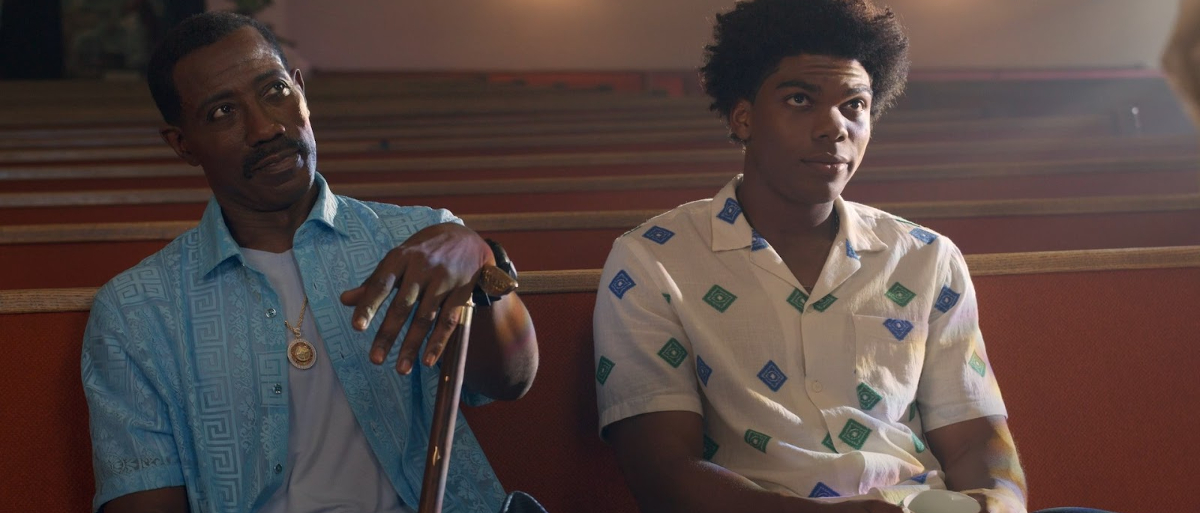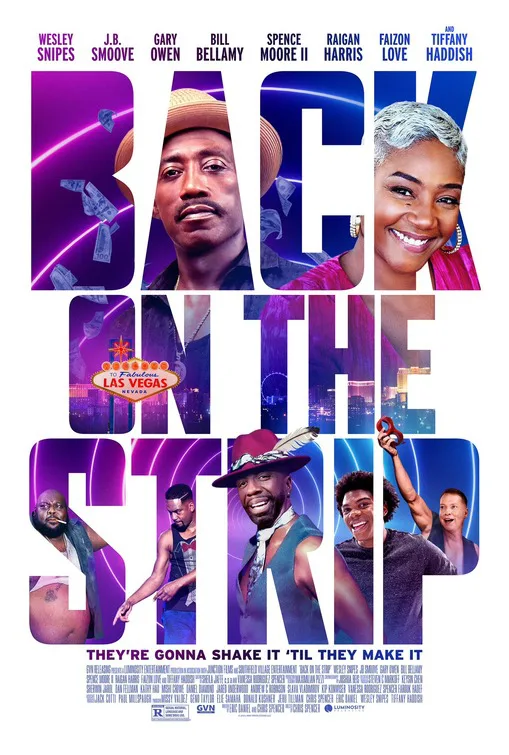“Back on the Strip,” about a young man who wants to become a magician and the middle-aged ex-strippers who train him to be an exotic dancer instead, is a slapped-together indie comedy. It would probably crater completely and become unwatchable were it not for the charisma of its actors, which is boundless, and the lightheartedness of the entire project: it knows that the purpose of this movie is to make people laugh, no matter what it takes, and that the more shameless the joke or sight gag, the bigger the laugh.
The strippers were stars in Las Vegas in the 1990s. They called themselves The Chocolate Chips. Wesley Snipes is the leader, Luther, aka “Mr. Big,” whose career ended when a car accident shattered his leg. J.B. Smoove is Amos, a preacher by day, and righteous. Bill Bellamy is Tyriq, a stay-at-home dad to four daughters he sired with his wife, a female bodybuilder. Faizon Love is Desmond, a garage owner who’s gained 100 pounds since his stripping days. Gary Owen is Xander, a white doctor with a successful breast augmentation clinic who, back in the day, fooled the other Chocolate Chips into thinking he was Black (more on that in a moment). Any of these actors has more charm and comic timing in his pinky toe than most actors have in their whole bodies. The film benefits enormously just putting them all together onscreen and watching as they get the old “band” back together, work through differences that split them up, and bust each other’s chops with the easygoing intimacy of brothers. (Kevin Hart’s name is on the poster, but he only has one scene; it’s a good one.)
Unfortunately, the movie isn’t actually about the Chocolate Chips. It’s about young Merlin (played by Spence Moore II) and his career ambitions and romantic problems. Will he get his dream job and capture the heart of his dream girl? You know the answer, and the movie knows you know the answer. But it still stays focused on Merlin, to the point where “Back on the Strip” turns into a modern equivalent of one of those old Hollywood studio movies that built a project around veteran movie comedians that audiences actually came to the theater to see (such as the Marx Brothers) but subordinated their clowning to a love story between a couple of comparatively bland leads.
When we meet Merlin, he’s a high school senior in Los Angeles who’s madly in love with his best friend and magic assistant Robin (Raigan Harris), one of those cheerful, poised, beautiful, smart ciphers that lovable, ambitious heroes often have in comedies. Merlin wants to go to Las Vegas and hit big as an illusionist, and tells Robin about his goal. Alas, his performance at the high school magic show is ruined by his own mistakes, then by the treachery of one of his rivals, the leader of a group of all-white self-styled gangsta rappers from Beverly Hills, who pulls down Merlin’s pants and underwear onstage. Thus do we learn of Merlin’s true gift: a member so enormous that when we see it tucked into his underwear, it looks like a kielbasa folded in half.
Flash-forward a few years to Merlin after college: he’s working as a birthday party clown with a trio of other clowns and still dreaming of going to Vegas when he runs into Robin again. Unfortunately, Merlin also meets her snotty, condescending boyfriend, who is about to become her fiancé. His name is Blaze (Ryan Alexander Holmes). He claims he’s a comedian, but he’s mainly an “influencer” who spends seemingly every waking moment recording himself and his posse and posting the footage online. Merlin’s supportive single mother, Verna (Tiffany Haddish), who’s also the film’s raunchiest character by far, helps her despondent son make his big move to Vegas by calling up her former employer Rita (Colleen Camp), an old stoner who runs a run-down motel with a burned out neon-sign (the only working letters spell out “VAGINA”), and arranging for Merlin to stay there while he’s auditioning for magic gigs. Of course Verna, a hardcore realist, has a secret agenda: she figures her son will have a better shot at being acclaimed for what’s in his top hat if he showcases the miracle in his trousers.
If you’re reading this and thinking, “I’ve seen this nice-guy-tries-to-steal-nice-girl-away-from-rotten-fiancé configuration a million times—what about the aging strippers played by can’t-miss character actors?” you’re just gonna have to deal with it. The movie is determined to push through the contrivances of keeping Merlin and Robin from realizing their destiny right up to the climax, which romantic comedy fans would see coming from 20 kielbasas away, even if the main couple didn’t discuss one of the most beloved TV variations of it on “A Different World” while watching a rerun of the episode in question.
Directed by Chris Spencer, who co-wrote the film’s screenplay with Eric Daniel, “Back on the Strip” doesn’t trouble itself with anything it isn’t really interested in, such as giving the romantic leads actual personalities rather than writing them as a couple of sweet but borderline-blank ingenues; or, for that matter, making you believe that young Merlin is a good or even competent magician. Verna tells us in her voice-over narration, which is often so forced that it sounds like it was written mainly to solve storytelling problems, that Merlin is a brilliant illusionist who wows audiences. But we never see him do anything more complicated than pull a string of handkerchiefs from his mouth or produce an object from behind another person’s ear.
“Back on the Strip” improves once the Chocolate Chips get together again and start rehearsing and reconnecting, and it becomes excellent during the comparatively brief section where it falls in love with its character actors. The movie gives all of the characters a dedicated subplot plus foolproof bits of recurring comic business that let the movie play to its only great strength: its ability to create enough of an atmosphere of trust that its performers can cut loose and clown in a way that goes beyond sketch comedy riffing and into the realm of the surreal. Amos has supposedly left the “sinful” stripper life behind but bumps, grinds, and dry-humps pews during sermons whenever the spirit takes him. Tyriq’s identity is so tied up in fatherhood that when he does his new routine, he instinctively starts combing women’s hair and folding their wraps in perfect squares small enough to fit into a diaper bag. The other guys are shocked when Xander shows up and is obviously a white man—none of them had a clue in the ’90s—and the fact that the script hand-waves away specific details of how Xander pulled off the magic trick (a more impressive illusion than anything Merlin attempts) makes the contrivance funnier—especially when he’s coming to terms with the racial privilege he’s always denied having.
“Back on the Strip” is qualitatively somewhere between a mid-level “Saturday Night Live” cash-in movie and a ’90s indie comedy where the cast greatly outclasses the screenplay. Its ingredients include a few genuinely excellent comic setpieces and several more that are fitfully amusing, and perhaps another dozen moments that let the older actors show sides of their talent that are more often ignored (most strikingly Love, who shows that he could carry an entire romance on his own, should anyone choose to write a brilliant script tailored to his talents and looks).
It’s worth seeing for its hardworking cast, Snipes especially. He seems to be having a career renaissance recently, and he adds another feather to his cap here, playing a once formidable and suave man who walks with a cane because of a car accident and can’t strip anymore, but still manages to seem like he’s in charge of any room that he enters. The filmmakers often cut to his reactions in ensemble scenes not because Big is always an integral part of what’s happening (sometimes he’s just one of several witnesses), but because Snipes’ acting is so rich. You can almost feel the other characters acquiring depth just because Big is paying attention to them and being affected by whatever they’re going through. Snipes doesn’t coast on audience fondness that’s rooted in earlier eras. He’s creating something new here: a real-seeming man with experience in his voice and an unwritten novel in his eyes. His performance is the film’s best magic trick.
In theaters now.




















